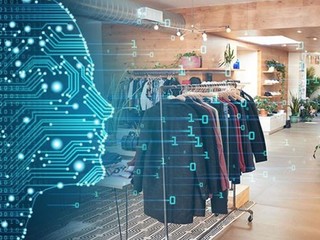Pitchbook survey: VCs see AI as high growth but also overinvested
The biggest focus areas for AI investing are healthcare and biotech
Read more... The majority of retailers have incorporated AI and machine learning: showed 71% of retail respondents say that AI and ML currently leads their IT/business strategy, including 62% who use the technology to predict business performance and 61% who use it for data analysis, while 56% use it as a driver of innovation and 52% use it to improve speed and efficiency, as well as to reduce risk in the future.
The majority of retailers have incorporated AI and machine learning: showed 71% of retail respondents say that AI and ML currently leads their IT/business strategy, including 62% who use the technology to predict business performance and 61% who use it for data analysis, while 56% use it as a driver of innovation and 52% use it to improve speed and efficiency, as well as to reduce risk in the future.
So no shock that the space is growing quickly: according to a research report by Market Research Future (MRFR), the AI retail market is expected to be $34.52 billion by the end of 2030, a compound annual growth rate (CAGR) of over 26.30%.
"AI technology has tremendous potential to transform retail sectors with integrated digital technologies. Besides, rising developments of built-in AI network chips are estimated to boost the AI market growth over the assessment period. Security systems, speech recognition, recommendation systems, better supply-chain management, and medical imaging are key areas in retail," MRFR wrote in the press release.
"With the tools, algorithms, and computing power, AI technology has enabled organizations to execute their work efficiently. Solution providers are investing hugely in fostering R&D activities to develop and improve the technology. Governments are taking up new AI initiatives to position their countries as global leaders in artificial intelligence."
Artificial intelligence is a part of so-called smart retail, which combines traditional shopping with and modern “smart” technology, using big data analytics and technologies like the internet of things, AI, VR, and AR to give the customer a better shopping experience. The larger sector is expected to be worth $211 billion by the end of this decade.
Some of the trends leading to this growth in AI adoption identified by MRFR include advancements in 5G and IoT technologies, along with growing government initiatives to drive the development of IoT-based modules, and the increasing demand for connected wearable devices would influence market revenues. It was also driven by digitization and automation brought about by the Pandemic.
"With companies becoming more data-driven, the market will witness vast demand over the next few years. These governments also adopt various measures to support research and development of retail tech and encourage companies to introduce AI technology by executing subsidy and public-private partnership (PPP) programs," the company wrote.
There are a number of startups in this space taking advantage of these trends, including RetailNext, a company that collects and analyzes shopper behavior data in real-time; True Fit, a digital fitting room solution that uses AI to gives shoppers the right size in apparel and footwear; CARTO, a Location Intelligence platform that allows organizations to use spatial data and analysis for more efficient delivery routes and strategic store placements; Standard AI, an autonomous checkout solution; and Stylumia, a company using AI for fashion trend forecasting.
Of course, many of the big players have also entered the space as well. For example, Intel partnered with ARENA15 in 2020, an immersive retail and entertainment complex, in January 2020 as a way to make it easier for customers to buy things by using Intel's technology and solutions. The company also partnered with Sensormatic Solutions, to powering Sensormatic IQ, its intelligent operating platform for retail.
Meanwhile, stores like the Home Depot and Pandora are using IBM technologies to create personalized shopping experiences, both online and in-store, and Google Cloud for Retail
allows retailers easily leverage AI throughout their organizations and gain real-time insights from their data.
In March, Aéropostale announced a partnership with MetaversePlus to bring the brand to the Metaverse. Through the partnership with Aéropostale owner Authentic Brands Group, a brand development, marketing, and entertainment platform, MetaversePlus is designing and developing Aéropostale presence in Web3 through NFTs, world building, as well as offering members only perks and promotions.
Of course, as much as retailers are embracing AI, there are still roadblocks, including a trust gap, with 55% of retailers saying they encountered pushback or scrutiny about the penetration of AI/ML in their organization and only 30% saying there are strongly enough checks and balances in place to avoid the negative consequences of AI/ML.
Organizations also seem to be split on whether or not they trust the results they get from this technology, as 35% said they slightly trust them, and slightly less, 33%, said they strongly trust them.
(Image source: toolbox.com)
The biggest focus areas for AI investing are healthcare and biotech
Read more...It will complete and submit forms, and integrate with state benefit systems
Read more...The bill would require a report on how these industries use AI to valuate homes and underwrite loans
Read more...